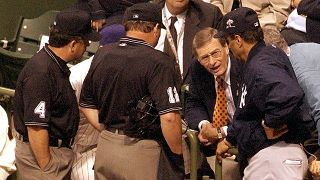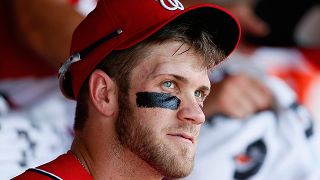|
I have only one request to make of my colleagues currently preparing to pretend Major League Baseball's All-Star Game, and the glorified carnival midway leading up to Tuesday's event, actually matters to anyone except whomever it is each participant has hired to keep track of his incentive bonuses. Please, all of you, don't tell me that it's really hot where you are. MLB put this year's game in Kansas City, the poster franchise for revenue sharing. Once upon a time, back when there was a reserve clause, the New York Yankees used to loot the Kansas City Athletics so badly that the Midwest team could never compete. Then along came free agency, and along came the Royals to replace the Athletics, who ran off to Oakland and won a bunch of championships despite being owned by a crazy person. (This was generally something of a recurring theme in MLB during the 1970s.) In 1985, the Royals actually won a World Series. Then, of course, we went through collusion, and the canceled 1994 Series, and eventually the Royals slipped to the bottom of the standings, whence they spent an awful lot of time griping about the unfairness of it all despite the fact that they were owned by David Glass, a Walmart gombeen who looked out his window and saw a universe of people who should be working for minimum wage. (To the surprise of absolutely nobody, during baseball's extended labor conflict of 1994 Glass was one of the people pushing hardest for the use of scab ballplayers.) Anyway, he was a cheapskate who put more energy into poor-mouthing than he did into building the franchise. Perhaps having been visited by three spirits one Christmas Eve, Glass seems in recent years to have become less content with presiding over MLB's designated landfill. The Royals have begun to produce some players, and they are worth going out to see if they come to your town and the boss wants to dump a couple grandstand seats on you because you landed that big widget account in Poughkeepsie last month. The point, and there is one, is that the one constant in Kansas City baseball is that, in the summer, no matter if the team is good or bad, no matter if it's the Athletics or the Royals, it's like playing in Dante's Old-Timers Game. (This is also true in St. Louis.) So please, I'm begging you, remind us once that it's hot, and then drop the subject so we can all concentrate on the real All-Star traditions, like trying to figure out which Home Run Derby competitor has the most talented pharmacist. The reason I keep coming back to baseball's All-Star Game, as opposed to all the others, is that, no matter how much they gussy it up and try to make it "significant" and wax nostalgic about the days when it really seemed to matter, the All-Star Game remains the single sharpest hatpin aimed in the general direction of baseball's inflated sense of self. And nothing has a more inflated sense of self than baseball. By comparison, the NCAA is the heir to the Three Stooges and the College of Cardinals is the reformed Sex Pistols. All that drippy, silly faux-Americanism was bad enough back in the day. You know how you know how bad it is? The sabermetricians came in and, refreshingly, brought the first original discipline to the analysis of the game since the invention of chewing tobacco, and within three years they turned as arrogant as every other baseball institution is. (As always, Bill James, who is still funny and intellectually interesting — true crime now? Cool — excepted.) Which is where the All-Star Game comes in. The All-Star Game is the annual banana peel, the yearly seltzer bottle, the most expensive whoopee cushion in the world and the largest dribble glass on the planet. It is baseball's great prank on itself, year after year. I mean, honestly, 10 years ago, the thing ended in a tie. A tie! And what a tie it was. There was Bud Selig, still the unlikeliest power broker since the ascension of Charles the Simple to the throne of France, in his brand-new ballpark in Milwaukee, the eyes of the baseball world on him, and it gets to the 11th inning tied at seven and nobody has any pitchers left. For you connoisseurs of baseball lore, Freddy Garcia struck out Benito Santiago for the final out. (Freddy Garcia was in the All-Star Game? Unkind souls might argue that the American League ran out of pitchers first.) And, never at a loss for the hilariously wrong phrase, Bud Selig defended his decision to declare a draw by saying that it was
wait for it
"a no-win situation."  It's hard to imagine a more no-winnish no-win situation than, you know, a tie. It was very hard to take baseball seriously after that; of course, I wasn't one of the saps who paid to watch a game that neither team won. And, of course, as it is never an institution to react calmly in a situation that calls for hysterical panic, Major League Baseball responded to the tie by making the All-Star Game "count" for something — namely, the home-field advantage in the subsequent World Series. So, in theory, anyway, if the Yankees blaze through 162 games and the preposterously extended American League playoffs with, say, 118 wins while the Braves stagger through 162 games and the preposterously extended National League playoffs with, say, 89 wins, the Braves get the home-field advantage in the World Series because, back in July, in an exhibition game, Starlin Castro of the Cubs hit a ninth-inning dinger off Chris Perez of the Indians. Wouldn't it have made more sense just to have Bud throw a couple innings in front of the home crowd back in '02? And there is the annual griping all around baseball about the rule that mandates that all of the teams be represented on the All-Star rosters. Why this bothers so many people is far beyond me. (Remember, I don't really care who got "snubbed" and who didn't because I am not an accountant in the employ of Scott Boras.) People talk about this making a "mockery" of baseball, as though baseball didn't desperately need all the mockery that the world can provide to it. While I'm sorry that someone had to come up injured, I'm glad that chance found a way for Bryce Harper to make the game, and I don't care about all the earnest arguments that there were more worthy players. Go out on the street. Find five people who can name any of those more worthy types. People know Bryce Harper. He is an authentic sensation. (Even if his tolerance for clown questions, bro, needs to expand more than a little.) Baseball needs authentic sensations just as much as every one of our sports does. Something is going to happen this week that makes Major League Baseball look very, very silly. A home run is going to hit a circling hawk and drop for a double. Some catcher is going to forget his mask. An umpire will split his pants. The game will last eight days because of recurring prairie thunderstorms. A manager will go to the mound with a rib hanging out of his mouth and a big old smear of Arthur Bryant's sauce down his chin. As always, thumbs will be sucked and beards stroked. What this comical event means to The Game will be parsed and argued over while the rest of the country gradually picks itself up off the floor and dissolves from guffaws into steady chiming giggles that last for hours. And then, having been made happy once again, people will feel themselves reminded of why they came to love baseball in the first place. So few of our major institutions have what Major League Baseball has this week — an annual reminder to get over itself and laugh a little. Everything needs that, god knows, and baseball would be foolish not to take full advantage of what it has. It gets reminded not to take itself too seriously, and the rest of us get to watch Bryce Harper play in a game that exists just so that players can play in it. It's hard to see a downside to any of it. In fact, as Bud Selig and I were saying over a couple of cold Leinenkugel's one day at Saz's, you might even call it a win-win situation.
|

